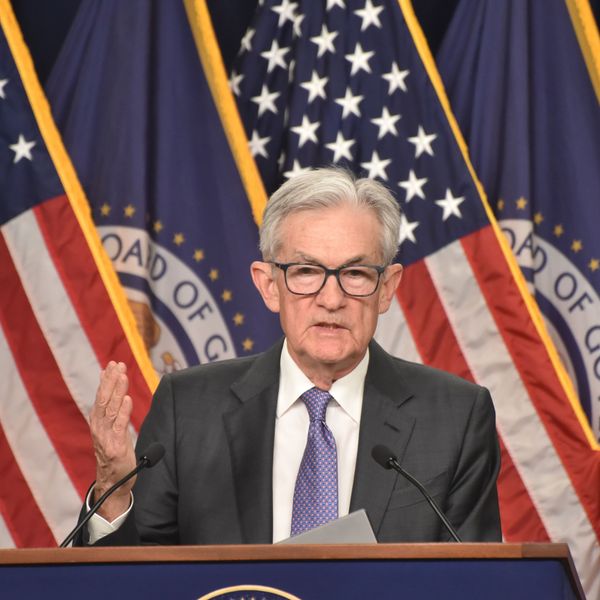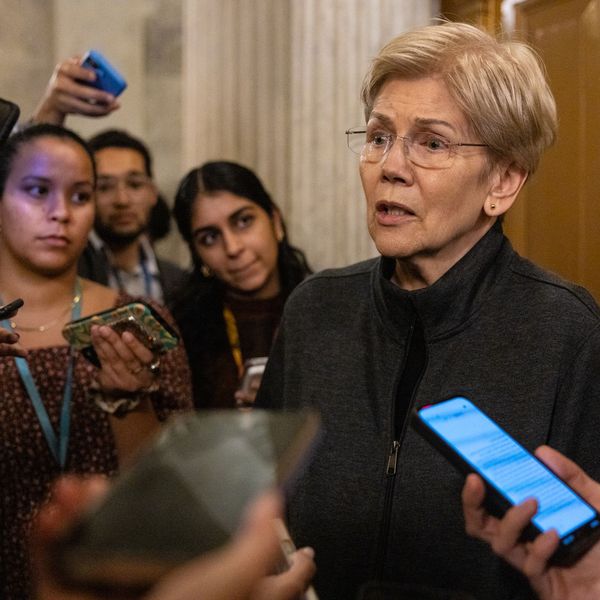Fed Knew of Rate Rigging Scandal, Did Nothing
Fox guarding the henhouse: Federal Reserve Bank of New York knew of Libor manipulation but exercised no regulatory control
In a sign of the close relationship between regulators and banks, documents released Friday show that the Federal Reserve Bank of New York knew of the rate rigging scandal as far back as 2007 and did nothing to stop it.
The scandal involves the manipulation of the London interbank offered rate, known as Libor, which is set daily in London by 18 of the world's largest banks, and has far-ranging influences, affecting the rates of mortgages, student loans and credit cards. By manipulating the rates, banks would have been able to appear in a healthier state.
As Rolling Stone's Matt Taibbi has noted in tracking the Libor scandal, "American officials in 2008-2009 were extremely concerned about the appearance of weakness in the financial markets, so much so that they may have resisted pursuing criminal prosecutions against big banks, and we also know that they spent a lot of time commiserating with Wall Street figures before and during the crisis."
Banking giant Barclays made waves last month when it admitted to rigging the rate.
The documents, released in response to congressional inquiries, show that the Fed knew that Libor was being rigged by banks years before it ended in 2009. While the Fed communicated its concerns to British regulators, it did nothing in its regulatory powers to stop the practice.
"You know, LIBORs being set too low anyway," a Barclays employee told a New York Fed analyst on December 17, 2007, according to transcripts.
On April 11, 2008, a Barclays employee told another Fed analyst: "(W)e just fit in with the rest of the crowd, if you like... We know that we're not posting um, an honest Libor."
This was followed by a sympathetic response from the Fed analyst:
"You have to accept it," she says. "I understand. Despite it's against what you would like to do. I understand completely."
As Mark Gongloff points out, the rate rigging "may have cost borrowers (when rates were manipulated higher) and state and local governments (when rates were manipulated lower) untold millions of dollars."
Reuters reports that while Barclays is so far the only bank set to pay $453 million in fines for the rate manipulation, "More than a dozen banks, including Citigroup, JPMorgan Chase & Co and Deutsche Bank, are under investigation over suspected rigging of Libor."
* * *
Matt Taibbi on Current TV on July 6 speaking about the Libor scandal and why the American people should be outraged:
An Urgent Message From Our Co-Founder
Dear Common Dreams reader, The U.S. is on a fast track to authoritarianism like nothing I've ever seen. Meanwhile, corporate news outlets are utterly capitulating to Trump, twisting their coverage to avoid drawing his ire while lining up to stuff cash in his pockets. That's why I believe that Common Dreams is doing the best and most consequential reporting that we've ever done. Our small but mighty team is a progressive reporting powerhouse, covering the news every day that the corporate media never will. Our mission has always been simple: To inform. To inspire. And to ignite change for the common good. Now here's the key piece that I want all our readers to understand: None of this would be possible without your financial support. That's not just some fundraising cliche. It's the absolute and literal truth. We don't accept corporate advertising and never will. We don't have a paywall because we don't think people should be blocked from critical news based on their ability to pay. Everything we do is funded by the donations of readers like you. Will you donate now to help power the nonprofit, independent reporting of Common Dreams? Thank you for being a vital member of our community. Together, we can keep independent journalism alive when it’s needed most. - Craig Brown, Co-founder |
In a sign of the close relationship between regulators and banks, documents released Friday show that the Federal Reserve Bank of New York knew of the rate rigging scandal as far back as 2007 and did nothing to stop it.
The scandal involves the manipulation of the London interbank offered rate, known as Libor, which is set daily in London by 18 of the world's largest banks, and has far-ranging influences, affecting the rates of mortgages, student loans and credit cards. By manipulating the rates, banks would have been able to appear in a healthier state.
As Rolling Stone's Matt Taibbi has noted in tracking the Libor scandal, "American officials in 2008-2009 were extremely concerned about the appearance of weakness in the financial markets, so much so that they may have resisted pursuing criminal prosecutions against big banks, and we also know that they spent a lot of time commiserating with Wall Street figures before and during the crisis."
Banking giant Barclays made waves last month when it admitted to rigging the rate.
The documents, released in response to congressional inquiries, show that the Fed knew that Libor was being rigged by banks years before it ended in 2009. While the Fed communicated its concerns to British regulators, it did nothing in its regulatory powers to stop the practice.
"You know, LIBORs being set too low anyway," a Barclays employee told a New York Fed analyst on December 17, 2007, according to transcripts.
On April 11, 2008, a Barclays employee told another Fed analyst: "(W)e just fit in with the rest of the crowd, if you like... We know that we're not posting um, an honest Libor."
This was followed by a sympathetic response from the Fed analyst:
"You have to accept it," she says. "I understand. Despite it's against what you would like to do. I understand completely."
As Mark Gongloff points out, the rate rigging "may have cost borrowers (when rates were manipulated higher) and state and local governments (when rates were manipulated lower) untold millions of dollars."
Reuters reports that while Barclays is so far the only bank set to pay $453 million in fines for the rate manipulation, "More than a dozen banks, including Citigroup, JPMorgan Chase & Co and Deutsche Bank, are under investigation over suspected rigging of Libor."
* * *
Matt Taibbi on Current TV on July 6 speaking about the Libor scandal and why the American people should be outraged:
In a sign of the close relationship between regulators and banks, documents released Friday show that the Federal Reserve Bank of New York knew of the rate rigging scandal as far back as 2007 and did nothing to stop it.
The scandal involves the manipulation of the London interbank offered rate, known as Libor, which is set daily in London by 18 of the world's largest banks, and has far-ranging influences, affecting the rates of mortgages, student loans and credit cards. By manipulating the rates, banks would have been able to appear in a healthier state.
As Rolling Stone's Matt Taibbi has noted in tracking the Libor scandal, "American officials in 2008-2009 were extremely concerned about the appearance of weakness in the financial markets, so much so that they may have resisted pursuing criminal prosecutions against big banks, and we also know that they spent a lot of time commiserating with Wall Street figures before and during the crisis."
Banking giant Barclays made waves last month when it admitted to rigging the rate.
The documents, released in response to congressional inquiries, show that the Fed knew that Libor was being rigged by banks years before it ended in 2009. While the Fed communicated its concerns to British regulators, it did nothing in its regulatory powers to stop the practice.
"You know, LIBORs being set too low anyway," a Barclays employee told a New York Fed analyst on December 17, 2007, according to transcripts.
On April 11, 2008, a Barclays employee told another Fed analyst: "(W)e just fit in with the rest of the crowd, if you like... We know that we're not posting um, an honest Libor."
This was followed by a sympathetic response from the Fed analyst:
"You have to accept it," she says. "I understand. Despite it's against what you would like to do. I understand completely."
As Mark Gongloff points out, the rate rigging "may have cost borrowers (when rates were manipulated higher) and state and local governments (when rates were manipulated lower) untold millions of dollars."
Reuters reports that while Barclays is so far the only bank set to pay $453 million in fines for the rate manipulation, "More than a dozen banks, including Citigroup, JPMorgan Chase & Co and Deutsche Bank, are under investigation over suspected rigging of Libor."
* * *
Matt Taibbi on Current TV on July 6 speaking about the Libor scandal and why the American people should be outraged:

